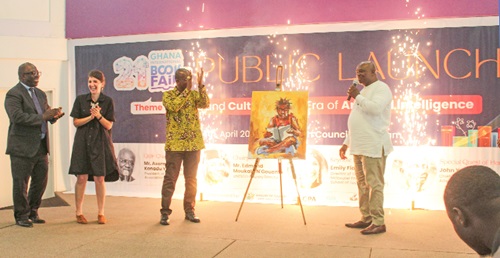
Artificial Intelligence not substitute for human brainpower —Publishers Association President
The Chairman of the Ghana International Book Fair, Asare Konadu Yamoah, has emphasised that although Artificial Intelligence (AI) is a valuable tool, it should not be viewed as a substitute for human intelligence.
He said AI should not be seen as a replacement for human creativity but as a tool that changes and improves what could be created.
He explained that AI was designed to complement an individual’s creative abilities by offering additional support in generating innovative ideas, insights and capabilities and helping people unlock their full creative potential.
He noted that AI made it easier, and efficient and opened opportunities for transformational innovations that were previously unimaginable.
Mr Yamoah made the remarks at the launch of the 21st edition of the Ghana International Book Fair on the theme, “Books and Culture in the Era of Artificial Intelligence.”
Despite the transform
Nature of AI
ative nature of AI, Mr Yamoah, who is also the President of the Ghana Publishers Association, said technology was fuelling people's anxiety and expectations about the future and increasing their drive to explore more.
“Our culture is being challenged to exhibit a variety of adaptable options and books are not exempted. As publishing professionals, looking far beyond what persists currently is not enough for our business practice and survival,” he stated.
He stressed that the implications of AI to publishers were that, they needed to overhaul their legal, technical and professional support systems such as their copyright laws, trade laws, industry conventions and practices and other services that we could be used for the performance of the trade.
“We need to provide solutions to this creeping influence of Artificial Intelligence. It is a disruptive occurrence that is already shaping up the entire human growth opportunities”, he added.
Book Industry
The UNESCO Country Director, Edmond Moukala N’Gouemo, emphasised the importance of the book industry and access to literature in fostering creativity and economic growth.
He noted that books allowed for exposure to new ideas which could spur innovation.
